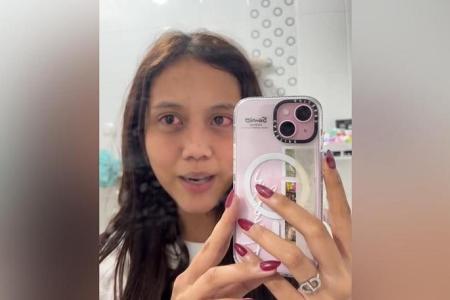Woman warns against buying contact lenses online
When Ms Azula found a pair of grey contact lenses online for less than $8, she snagged the item without thinking twice.
After all, she has worn contact lenses for over 10 years and bought lenses from such platforms before.
But after a few hours of wearing them, Ms Azula, 24, a full-time content creator who declined to give her full name, said she started feeling a stinging sensation in both eyes.
She removed the lenses immediately and noticed that her eyes were “red and felt as though they were on fire”.
Then came the blurred vision, swollen eyeballs and extreme discomfort. Ms Azula, better known by her online moniker Azula Cinta, said: “I wanted to remove my eyeballs; it was like needles were being inserted into my eyes.”
Ms Azula, who has more than 109,000 followers on TikTok, took to the short-video app to warn people about her experience. In the May 18 video, which has since gained 14.7 million views, her eyes are bloodshot and watery, and the whites of her eyes are swollen.
She visited the doctor the next day and was told the reaction was because of an infection caused by the lenses. She discarded the lenses immediately and was prescribed antibiotics and special eye drops to treat the problem.
Checks by The Straits Times found several online sellers from countries such as China, Thailand and Malaysia listing contact lenses at significantly lower prices than those found at optical shops here.
For example, a pair of brown lenses, which is advertised as lasting for three months or longer, sells for $3.60. Other lenses on various platforms are listed under $10.
In comparison, a pack of 30 powered daily lenses, which will last for 15 uses, from the brand Acuvue sells for about $37 at most optical stores, while non-powered dailies can cost upwards of $15.
Ms Claudia Quek, 28, bought a pair of green contact lenses from an online seller in May to try out for her upcoming wedding, as she did not want to wear spectacles.
After the senior account executive in the public relations sector wore them for about two hours, her eyes became red and teary, and eventually her vision got blurry.
“I went to the doctor and was given an earful. I have sworn off contact lenses now,” said Ms Quek, adding that she has decided to wear spectacles for her wedding.
In response to queries, the Health Sciences Authority (HSA) said powered contact lenses meant to correct vision problems are regulated as medical devices.
These products have to be registered with the HSA to ensure they meet safety, performance and quality standards. All importers and wholesalers of powered contact lenses must also be licensed by HSA.
The Optometrists and Opticians Board (OOB), under the Ministry of Health (MOH), requires all contact lenses – both powered and non-powered – to be prescribed and dispensed only by registered optometrists or contact lens practising opticians, HSA added.
The agency said it has received feedback from users who experienced serious eye-related conditions like pain and blurred vision after using unregistered or counterfeit contact lenses, but it did not disclose the volume of feedback.
HSA said it works closely with MOH and OOB to tackle the illegal supply and sale of contact lenses, with MOH issuing warnings between 2021 and 2023 to 31 people found to have prescribed, supplied or dispensed contact lenses without the required qualifications.
During the same period, HSA detected 203 product listings selling unregistered contact lenses on local e-commerce and social media platforms, which were taken down promptly after it worked with the administrators of such platforms.
Between 2021 and 2023, HSA took enforcement actions, including issuing warnings and composition notices, to 19 people for supplying unregistered contact lenses.
It said: “To further tackle the illegal supply of contact lenses online, HSA collaborates with local e-commerce and social media platforms to educate them on the regulatory requirements.
“HSA and MOH have also rolled out educational campaigns to raise public awareness of the dangers of buying contact lenses from dubious sources, including online platforms.”
Dr Leo Seo Wei, an ophthalmologist at Dr Leo Adult and Paediatric Eye Specialist in Mount Elizabeth Hospital, noted an increase in cases of people suffering from contact lens complications after a surge in online shopping during the pandemic.
“I would say I see at least one case a month”, she said, adding that she used to see about eight cases a year before the pandemic.
Dr Leo advises consumers to buy contact lenses only from certified eye-care professionals who can provide a proper fitting and ensure the lenses meet safety standards. This reduces the risk of eye infections and other complications.
Some short-term effects of wearing contact lenses bought from non-certified sources include redness, conjunctivitis, allergic reactions, corneal abrasions and infections, she said, adding that severe corneal infections or ulcers can lead to blindness.
Ms Azula said she has learnt her lesson. “The best thing we can do is to not gamble on our sight. I was really lucky I did not go blind,” she said.
Get The New Paper on your phone with the free TNP app. Download from the Apple App Store or Google Play Store now


